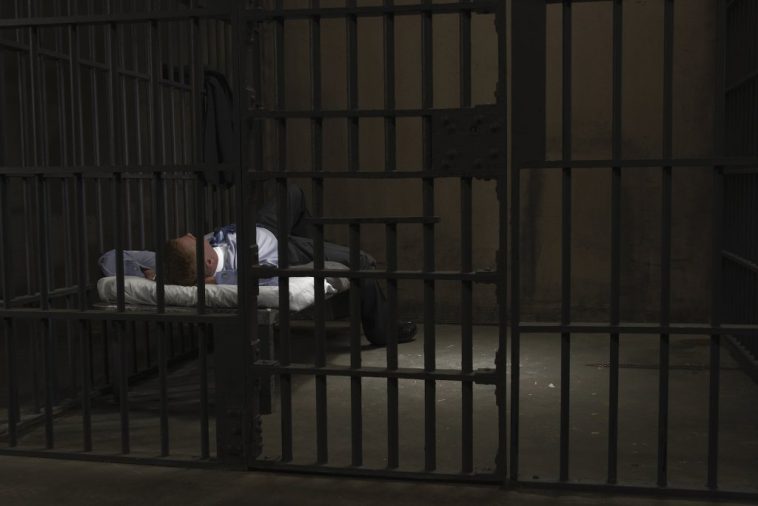A legislator from Arkansas is striving to halt the construction of a new correctional facility in Franklin County, advocating for a focus on crime prevention instead of infrastructure expansion. State Senator Bryan King, a member of the Republican Party, is escalating his resistance to Governor Sarah Huckabee Sanders’ proposed plan for a new correctional facility in the aforementioned county.
King made a significant move on Thursday, with the submission of six different bills designed to obstruct the building of this new prison, projected to accommodate 3,000 inmates. The legislation also targets eight different counties within the state of Arkansas, suggesting a significant overhaul of the state’s criminal justice strategy.
One of King’s legislative proposals is centered around the redistribution of finances allocated for the projected prison. The bill proposes the redirection of $600 million from surplus funds and already assigned funds. This substantial sum of money would instead be deployed towards addressing various issues embedded within the state’s criminal justice system.
King’s remaining proposed bills are dedicated to confronting issues related to the accumulation of unresolved cases in county jails, materializing and implementing crime reduction and prevention measures, and suggesting amendments to the state’s constitution. These amendments would permit the utilization of revenues from medical marijuana and casino sales as a source of funding to tackle these issues.
King’s concern is focused on approaching the issue of crime from the onset, arguing in favor of supporting functions such as county deputies, probation, and parole which, according to the senator, have been strained and inadequately compensated for years. He affirms that without this focus, constructing even multiple prisons would not adequately address the current challenges faced by these counties.
However, despite King’s strong propositions for crime prevention as primary focus, Governor Sanders and him have yet to find common ground on the matter. The governor publicly addressed King’s efforts to stop the prison plan, dismissing it as an unfeasible solution.
Governor Sanders highlighted that most county officials are not in support of King’s argument, with majority pushing back against the proposed idea. While King has maintained his stance, insisting that the new prison construction will place a heavy burden on taxpayers and that better, alternative solutions do exist.
In his argument, King asserts that the ultimate aim should not be centered around making more arrests and increasing the population in prisons. He reminds that the state already has a high incarceration rate, and suggests that public safety should focus more on making communities safer, where the need for making arrests is lowered significantly.
With regards to the existing problems of prison overcrowding and high incarceration rates, the office of Governor Sanders acknowledges these challenges. However, they point out that the governor has already made significant effort to address these, playing a part in relieving the strain on existing facilities.
The governor’s office revealed that she had previously increased the bed capacity in current prison facilities by almost 1,500 in the past couple of years. However, despite these advances, both sides remain firm in their stance on the necessity of the new prison, continuing their respective efforts to champion their perspectives.
Undeterred by the opposition, King continues to press for more insight into Arkansas’s current penal system. He recently submitted a Freedom of Information Act request to the Board of Corrections. This appeal looks to shed light on the origin of the state’s incarcerated population and serve as a valuable insight into spatial trends of criminality within the state.
In a bid to assert his stance, King states that prisons should be located in counties where crime rate is at its peak. He highlights that about 67% of the state’s inmates originate from a mere eight counties. This is why, according to him, the focus of correctional facility construction should be oriented towards these counties.
The eight counties named in the FOIA request, each coupled with the percentage of offenders originating from each, are: Washington, contributing to 8% of the total number of offenders; Sebastian with 8.6%; Pulaski accounting for the largest proportion of 21%; Jefferson at 5.4%; Saline at 5.5%; Faulkner attributing to 6.5%; Crawford coming in at 4.5% and finally, Benton at 7.1%.
In summary, the disagreement between Senator Bryan King and Governor Sarah Huckabee Sanders over the construction of a new 3,000-bed correctional facility in Franklin County has highlighted contrasting approaches to addressing crime in the state of Arkansas. As they both continue to advocate for their respective strategies, it remains to be seen how this will ultimately shape the state’s criminal justice landscape.
While the governor leans towards infrastructure expansion and capacity increase, King’s approach is more preventative, focusing on tackling issues from the onset. His proposed bills call for an overhaul of the current system, involving a redistribution of allocated funds, focus on crime reduction and prevention, and a constitutional amendment allowing certain funds to aid in these pursuits.
This strategic difference emphasizes the delicate balance of addressing crime in an effective manner while also ensuring public safety. Despite their contrasting approaches, it is clear that both Governor Sanders and Senator King hold the safety and wellbeing of Arkansas’s communities at heart. As such, irrespective of how their debate resolves, it will certainly be intended to advance the interests of the state’s citizens.


